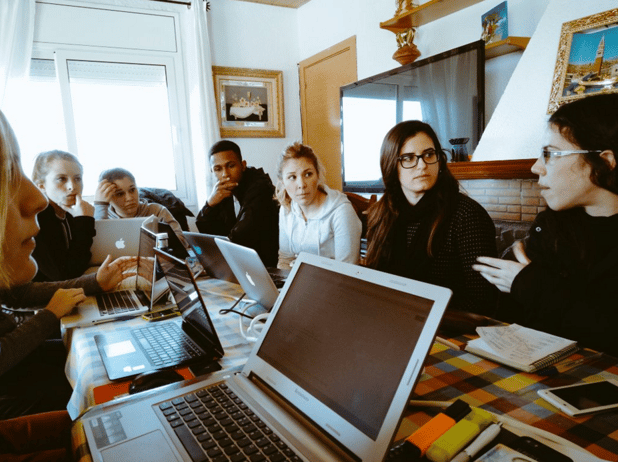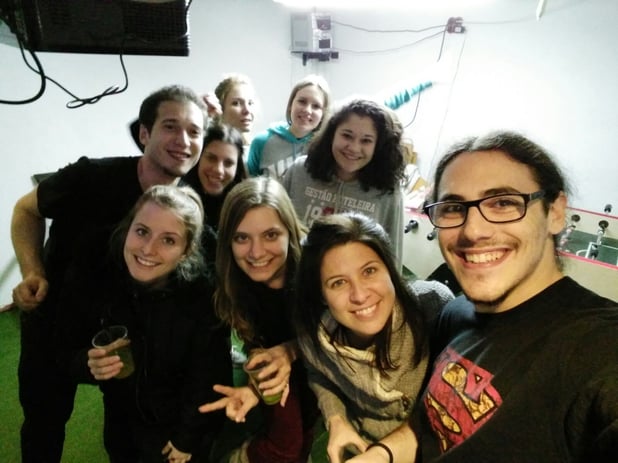By Laia Cardona, on 10 March 2016
Last week here at Cyberclick we celebrated our Winter Retreat. For two days we retreated from the temptations of the modern world and went out to the country to let our creative sides out and unite our team. Moving our office to a rural house helped us to disconnect from our daily routine and allowed us to focus entirely on setting this trimester’s objectives and organize activities to strengthen our team’s bonds. So, I am going to tell you all about the questions you have to ask yourself and your team to give your company the perfect retreat (which is what we do here at Cyberclick).

More than once, company leader have asked us “is it necessary to have a retreat all together?” and we, or David Tomas, the founder of our dear company, answer “what do you think?”. As devoted believers and fans of these retreats, we emphasis how useful a tool it can be for a company. The team returns to the office with a fresh motivation. It is not, however, the same for everyone. Retreats can have a great effect, but the right people need to take part at the right time.
If you have created your own happy company, as David explains in his recent book “The happiest company in the world”, then your whole team will be more than excited to take part in the retreat. These retreats allow us to take a step out of our daily responsibilities and get a new perspective on our work. To access different parts of our brains and hearts and take on our work with a whole new level of power.
But what makes having a retreat worth it? How do you know you’re not just wasting time? If you have clearly defined the objectives of taking your team out, then congratulations are in order. You know just what you’re doing. But, if this is not the case, I recommend that you first ask yourself the following questions, and you will find out if you should organize a “spiritual” and working retreat for your team.
1# What is your focus?
A company escape to work outside of your usual everyday surroundings is a great tool when a group has something important to work on all together. For example, at Cyberclick we use a Winter Retreat to define the goals of the new trimester, and a Summer Retreat to define our yearly goals. Other focus points could be:
- Developing a company strategy
- Resolving conflicts
- Work agreements
- A new initiative
- Planning actions
These and many others are interesting reasons to make this kind of event happen. Your escape becomes a place of refuge to innovate, find new possibilities and visualize your organization in a different light, and then apply that in your day to day routine.
2# What's going on with the personal relationships in the team?
It is vital to know how to build a team. This needs to be worked on not only previously, during the selection process, but also afterwards, in the day to day working hours.
When looking for a new member for our team, we should choose people who are highly capable and motivated for the tasks they will be doing, but also who are aligned with the corporate values and the values of the rest of the team. A method that can help with finding the perfect person is getting the rest of the team to participate in the selection interviews, and them give them a voice and vote when it comes to making the final decision.
On the other hand, once people are already a part of the organization, working on personal relationships needs to be a daily habit. Retreats can be a very powerful tool to do this. The interaction between colleagues outside of the office can help build a solid social foundation and discover what each person is like, on a personal level.
Retreats can be used to get work done, but should also include time of fun and laughter. It will allow to better align interpersonal relationships with the company’s goals and help people to work and organize together more successfully.
It can also be useful to solve a general problem the company may have, but it is not a good idea to solve conflicts between only a few members of the team. It is better to take on this kind of issue back in the office in a discrete fashion, involving only the people it affects and a mediator, if necessary.
3# Who should plan the retreat?
We recommend the whole team participate. You can break down the whole retreat into different tasks and put one or a few people in charge of each one. Like this, everyone will be involved, like an important part of the event and it wil build excitement for it. An example of a list of tasks would be:
- Research and booking of the house in which the retreat will take place
- Designing a food plan and purchasing all food
- Choice and organization of transport to get there
- Creation of a itinerary of what to do during every hour of the retreat
- Teams to cook and prepare food (per shifts)
- Leisure team: planning fun activities
- Planning team-building activities
In the planning, as in every other aspect of the event, follow a previously defined and agreed on schedule, to help optimize your time and work. Everyone should be clear what will be happening at each moment, and how long each activity will take.
4# Who should go?
Here at Cyberclick, we say everyone should take part! But we understand, of course, that each company is different as has its own ways of working, so who should go and when changes. If the organization is of a considerable size, you could organize retreats per area or department, or in smaller working teams, for example.
5# How long should it last?
Several factors come into play when making this decision:
- What you wish to achieve or solve will decide whether it should be longer or shorter.
- How much time each person can dedicate to this activity, as it involves total dedication, including pending nights away from home.
- If the location is further or closer away.
At Cyberclick we dedicate two days and one night to our Winter Retreat, but in summer, as we set our annual goals, we decide to spend three days and two nights away form the office. This is, if it is convenient for everyone, and we always do our best to make it happen during weekdays.

6# Where should it be?
The location of your retreat can very well determine its success. Here are some important things to keep in mind when choosing:
- Outside the office is always better: much better. Although doing a retreat in your office could be quite innovative if the space allows it.
- Somewhere appropriate to spend the night.
- What level of comfort are you looking for? For us it is essential to have Internet connection, as we dedicate part of our time to work.
- Look for somewhere special, or out of the ordinary.
- Adjust to your available budget for the activity.
In our case, we always go somewhere relatively close, which takes us no more than an hour and a half to get there by car or public transport.
7# How do you prepare the participants?
Every team member should arrive at the retreat with full comprehension of its purpose, knowing the itinerary and the desired results. Expectations should be clear and shared. Whether or not everyone has all necessary information and the itinerary ahead of time could make your trip flunk or fail. If so, your team will start off their retreat with all necessary knowledge, raising spirits and excitement.
After all, a retreat is an adventure that takes a whole team to another place, far from the office, in search for creativity, motivation, bonding between teammates and improving the work that will later place in the office. Without ever forgetting, of course, those oh-so-important moments of fun, when we, for example, enjoy nighttime karaoke after our beloved mojito and snack sessions. Our talent for singing may be questioned, but our motivation and excitement cannot be beaten.
I hope this post will help you create high quality, successful retreats, and for any questions you may have or experiences you would like to share, please do not hesitate to contact us.
Laia Cardona


